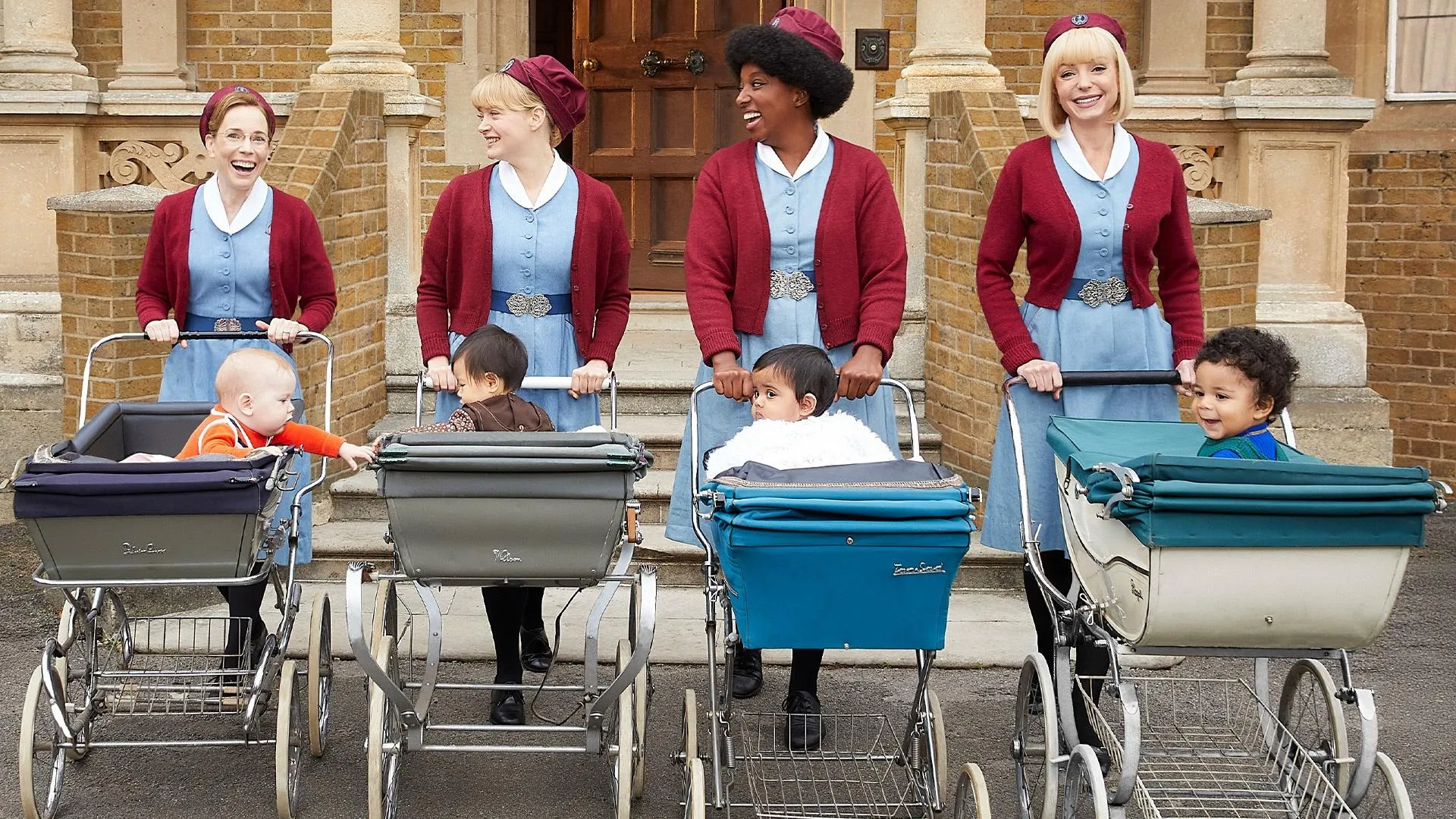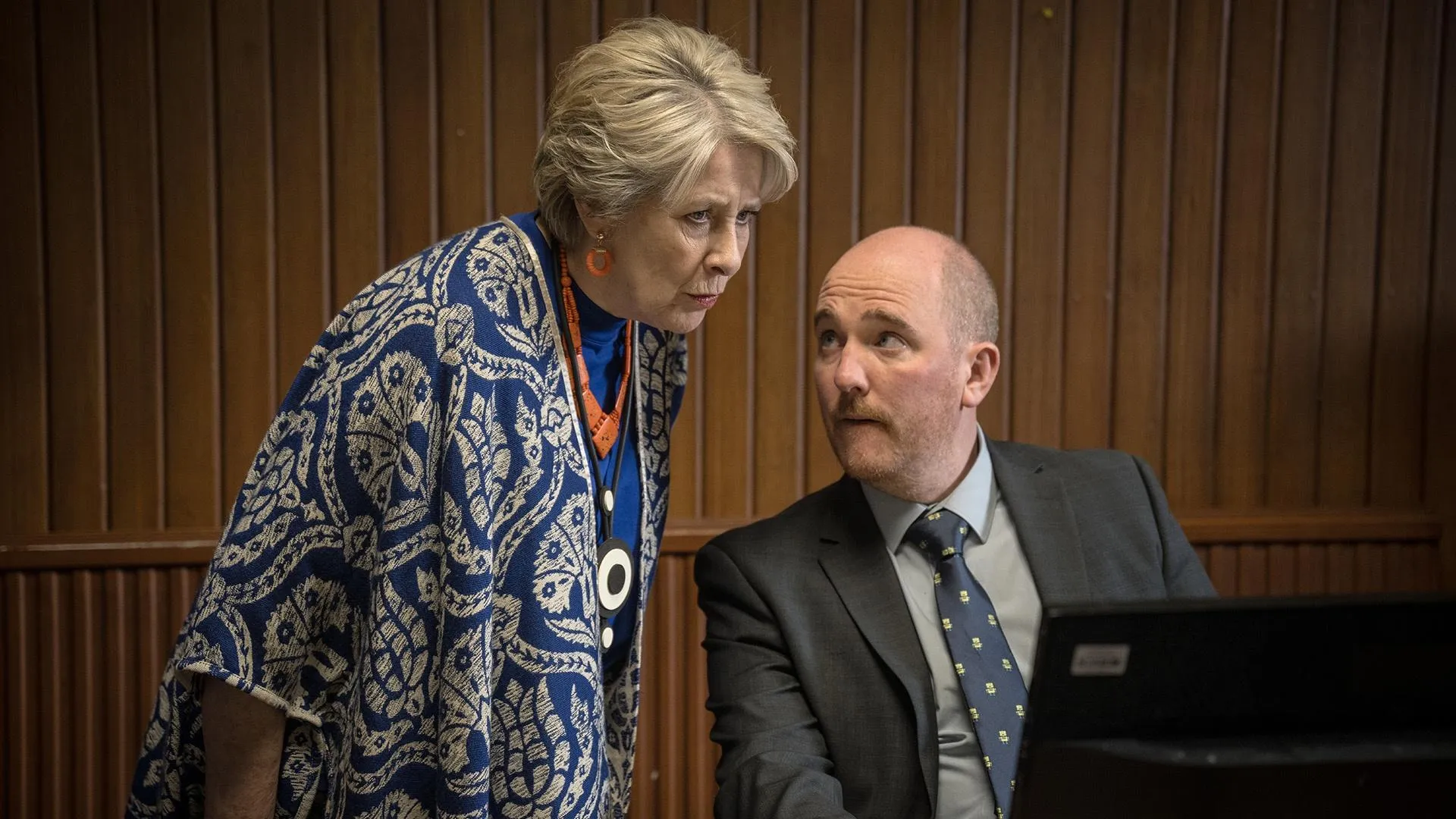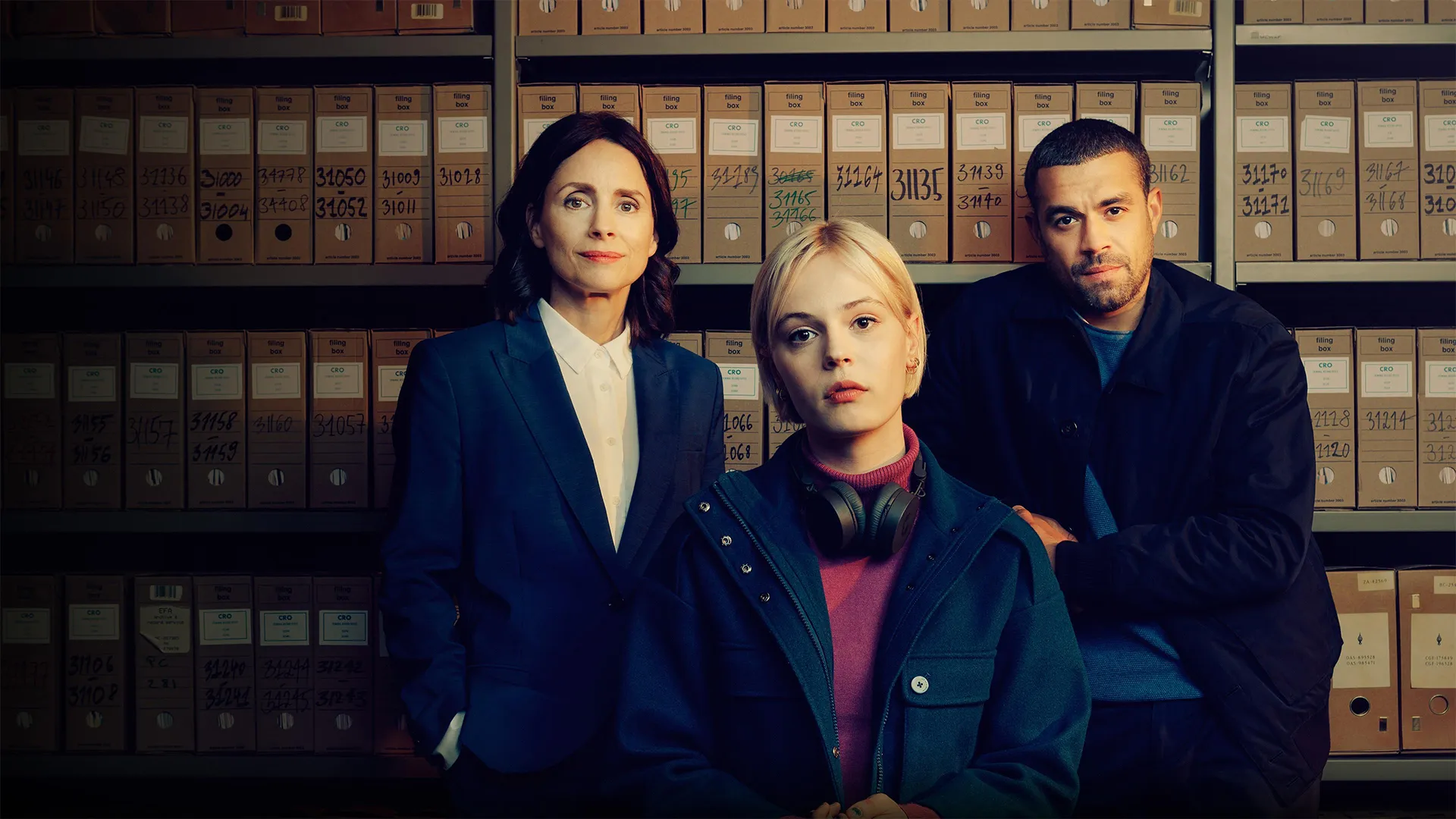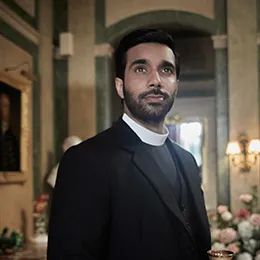

Grantchester Star Rishi Nair Answers Fan Questions
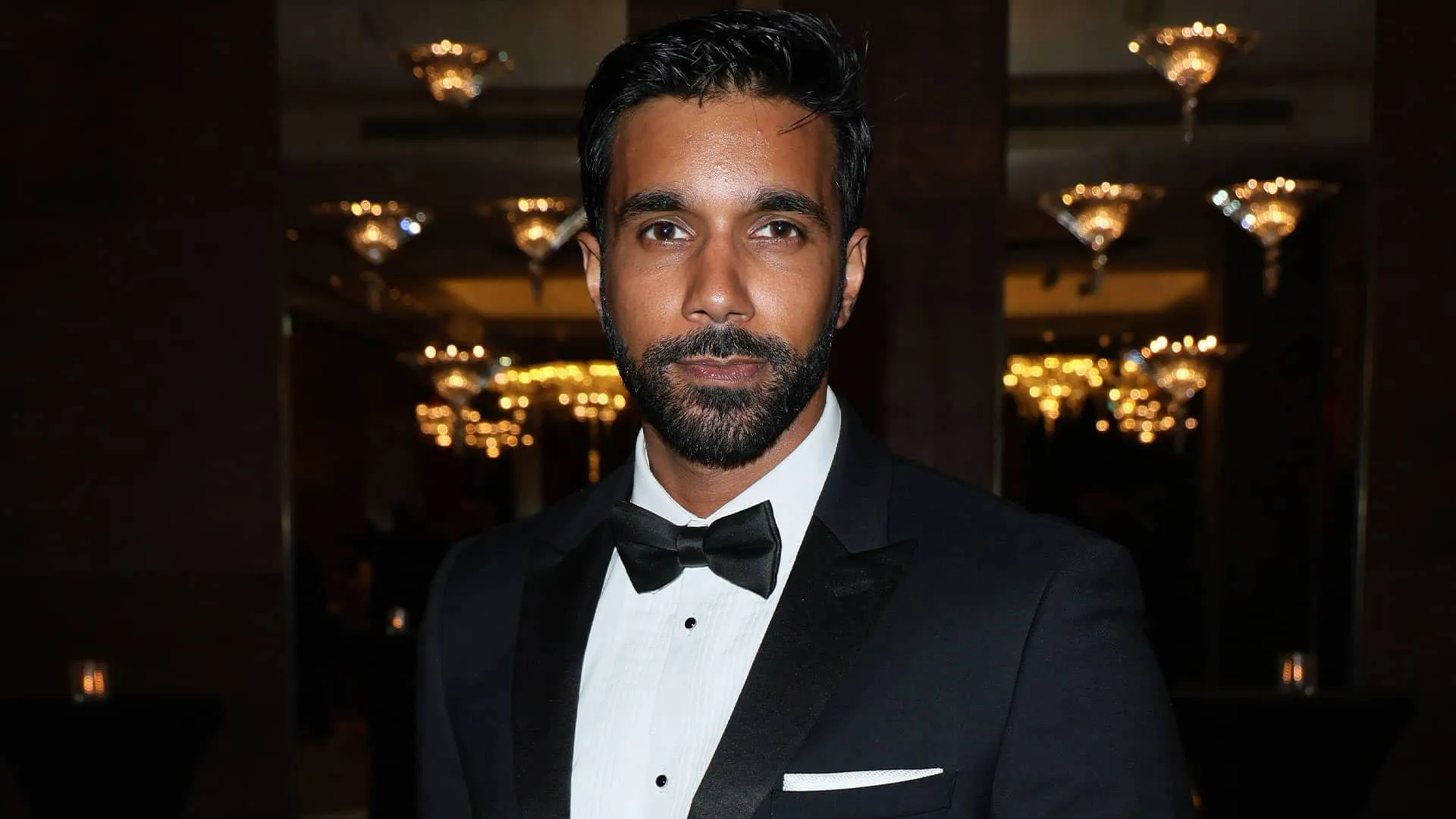
You asked, he answered! Grantchester star Rishi Nair, AKA Alphy “The Good Reverend Love ‘Em and Leave ‘Em” Kottaram, answered burning fan questions sent in to MASTERPIECE on PBS. Read on to learn more about how Nair prepared for the role of a vicar, who the biggest prankster on set is, what it’s like working with the adorable Dickens, and more.
Masterpiece:
Our first question is from Emily, who wrote: "I'm a longtime fan of the show and would love to know what Rishi thinks are the most challenging aspects of playing a vicar, especially one whose life is set in such a different time?"
Rishi Nair:
The first challenge of being a vicar, for sure, is the dog collar. That is super uncomfortable, and especially because we film in the summer months, it's very warm, and my suit is made from wool. I don't think you can actually see on the screen, but I have a shirt, and then I have this black vest on top, then I have the waistcoat, then I have the blazer. So it gets very hot underneath all that.It's quite funny being in a vicar's outfit for the whole day. When you're filming, there's a lot of time where they're setting up cameras and stuff. So I went for a walk and people [in town] were kind of looking at me, and being really smiley and nice. I was thinking, "Oh God, people here are really lovely." And then I realized, when people don't know that I'm an actor, and think I'm a vicar walking the streets, they're very smiley and kind. I was tempted to ask people to tell me what their sins were, but I restrained myself.
Masterpiece:
Alta from Lancaster, Pennsylvania wants to know: "Who are some of the actors or mentors you admire in the world of acting, particularly those who have inspired or helped shape your portrayal of Alphy?"
Rishi Nair:
There are actors that have inspired me as an actor, that I really love watching their work. I love watching Anthony Hopkins. I think he's a brilliant actor. I love Kate Winslet. I guess all men have Robert De Niro and Al Pacino [on their list], don't they, as the kind of people that they love. Daniel Day Lewis, Leonardo DiCaprio...I love Christoph Waltz. I'm a big, big fan of his work. I think his performance in Inglorious Basterds is probably one of the best performances of all time. As is Anthony Hopkins' in the one where he has dementia, The Father. His performance in that was really memorableI don't think I really looked at any other actors, in terms of me playing a vicar. I'm not religious, but when I got the role and I was going to do it, I actually went to church a couple of times on a Sunday, just to watch different vicars do their sermons, and see how it is. They're so varied. Some are quite performative, some are quite conversational, some can be a bit more monotone. It's funny, isn't it? I'm an actor, I've done a lot of theater, and actually going to a church and watching a vicar there, it's kind of the same thing. They're performing on a stage to an audience, in a way.
Masterpiece:
Diane asked, "You have such a pleasant nature and positive energy as your character Alphy. Are you transferring it from you as Rishi, or did you adapt it as a trait of the character?"
Rishi Nair:
I would like to think that's part of me, actually. I guess I'm quite similar to Alphy, in terms of, Alphy's described as glass half full, quite positive, looks at things in positive ways. And I think that's how I like to live my life, to see the best in people, and try and be as positive and half glass full as I can. Alphy has that, but he is also a vicar, and he has to be very understanding of people, and has to see both sides of every kind of argument, or any murder, or whatever it's going to be.
Masterpiece:
Gay H. wants to know: "Please share an off-screen moment with Robson that made you laugh until you cried."
Rishi Nair:
The ones that really make me laugh are the ones where there's nothing that's even funny. Me and Robson have this thing. I think that I'm quite good at holding my laugh in when I find something funny. But Robson can look me in the eye, and he can sense it in my eye. And once he sees me going, it sets him off. And then we end up like two little school kids, because we're just laughing. It always happens when it's the most serious scenes, when someone's giving some really heavy dialogue, whether it be about a murder, or this, or that. And okay, it's funny the first, second time, but then the crew and the director start getting a bit like, "Okay, we need to get this done now." But that just becomes more funny to us. So you end up in this cycle of just laughing over nothing, and the more people get annoyed, the funnier it becomes.
Masterpiece:
Linda asked, "What are some of your favorite books? And what books do you wish would be adapted for television?"
Rishi Nair:
I really love The Kite Runner [by Khaled Hosseini]. And the same author did A Thousand Splendid Suns, which I really, really loved as well. If they ever got made into TV shows or films, which I think they should, because they're such powerful stories, I would love to be in those.
Masterpiece:
Melanie S. from Virginia wants to know, "Who is the biggest prankster on set?"
Rishi Nair:
Do you know what? I probably have to say myself. I do love pranking. I love pranking Tessa [Peake-Jones], and I love pranking Robson [Green]. He's a veteran actor, and he's so on it all the time. He knows exactly what's going on in all the scripts. He learns his lines ahead of time. So what I sometimes do is, I'll come up to him and say, "Oh, have you heard?" And he says, "What?" And I say, "They're bringing this scene forward," and I'll pick a really long dialogue scene. And I say, "We need to film it this afternoon. They can't do it next week." And every time I get him. He responds, "What?" I can't do that. I can't just learn that." And then I say, "No, I'm only joking."
Masterpiece:
Nance would like to know, "What do you find most challenging about playing Alphy?"
Rishi Nair:
I think making sure we're sticking to the '60s way of talking. Obviously, we're not using slang because it's not in the script, but sometimes you can say words in a certain way that feels quite modern. Obviously, we live in 2025, and sometimes you want to be as natural as possible, but you realize that the way you are saying it actually isn't right for that period of time. It's too modern.Another thing I have to always be mindful of is that I'm a vicar. I sometimes get into this thing where, because I am a vicar that's solving crimes, and when I'm in the interrogation room and asking questions, I always have to remind myself I'm not a police officer.
Masterpiece:
Linda wants to know, "What do you like most about Alphy? And is there anything you dislike about him?"
Rishi Nair:
I think what I really love and admire about him is the way he deals with situations that most people would react quite angrily to, or be very hurt by. He kills people with kindness, whether that be people just being rude to him, or whether that being people judging him because of the color of his skin. The way that Alphy deals with it is with a smile, and he...doesn't really take it to heart, which I think to the perpetrators catches them off guard.I love Alphy. I don't think there's anything that I dislike about him. I like him and I like his flaws as well. I think they make him who he is.
Masterpiece:
Rosanna wants to know, "How did you get into the film industry? And would you say that this was always your goal?"
Rishi Nair:
It was something I always dreamt of doing. In England we have school, and then we have college, and then we have university. When you finish college, before you go to university, you decide what field you want to go into. So at that point, I wanted to be an actor. My dream was to be an actor. But I didn't really see anyone that looked like me playing lead roles. And I wanted to be a lead actor. I didn't want to be the stereotypical doctor or the geeky computer things that you would always see South Asians portrayed as.I felt like me going to drama school was being a bit naive and putting all my eggs in one basket, so I didn't think that was the wisest decision. So I went to university, did law for three years and graduated with my law degree.Then I thought, "Okay, I'm going to give it [acting] a shot now." For my first four or five years working, a lot of the time it was for free, doing these student projects where they needed an actor. I would come in, do a couple of days. Through those years, I built a reel together, then sent it off to agents, then started doing plays above pubs that would have capacity of 30 people. Some nights we'd have, like, six people in there. Very intimate. I progressed my way through that, and slowly, slowly worked my way up to where I am now.
Masterpiece:
As a reverend herself, Anne is very interested to know: "As an actor, what kind of things did you learn to effectively play the part of a priest?"
Rishi Nair:
Watching the sermons, and I think sitting in a church while those sermons were happening, and even just sitting in churches and cathedrals when no one's performing anything... I wouldn't class myself as someone so religious, but you do feel this sense of what people must feel when they fill in a church, or in any holy place.It's funny, when I go to Grantchester and we actually film the scenes in the church, every time I walk into that church, and because I'm dressed as a vicar, it's like I have this overwhelming sense of responsibility to portray this character truthfully, because a character like Alphy is probably very important to a lot of people out there.
Masterpiece:
Bill from New York would like to know, "How much fun is it to drive that Triumph convertible?"
Rishi Nair:
It's a really lovely car to drive. As soon as you put your foot down on the gas, the noise it makes, yeah, it gives you quite a thrill. And especially for a vicar, man...I'm driving a red convertible in the '60s. It actually drives really well, considering it's a car from the '60s. Once you get it going, it's actually really smooth. Do you know, sometimes, we do a lot of shots in the countryside where Alphy's going, and on screen you only see a couple of seconds, but sometimes we spend about two hours doing that. And I honestly don't mind.
Masterpiece:
Barbara would like to know, "Are you a dog lover? And if so, having scenes with Dickens, is that a bonus to your character?"
Rishi Nair:
Oh, I'm a huge dog lover. Days with Dickens, obviously, they are the best days. He's such a well-behaved dog. I've actually never met a dog so well-behaved. He's so impressive as well, because we have marks on the floor as actors, that you need to hit to be in the right kind of frame. Dickens has marks, and he hits his marks perfectly. And I'm watching him thinking, "What is going on? How is this possible?" It's actually quite distracting, because I'm just so impressed by him that I forget that I'm also in the scene.
